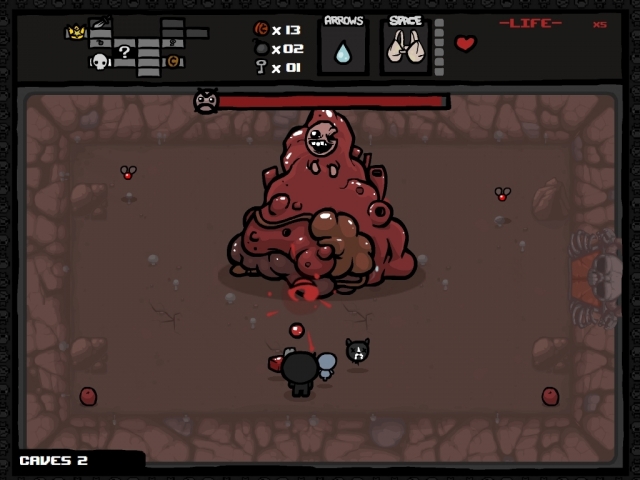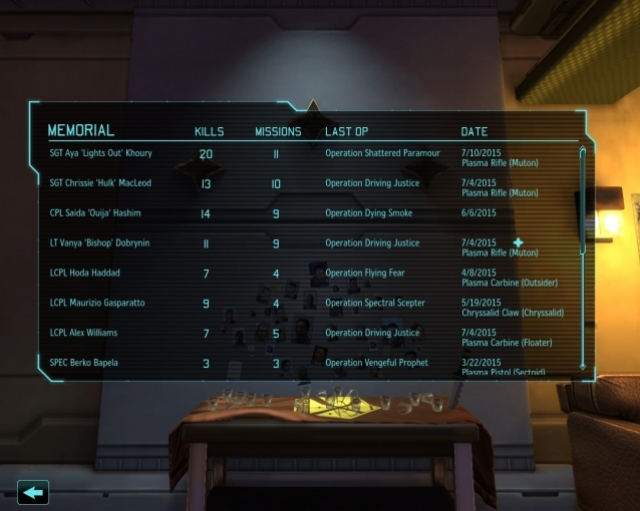
Three Reasons to Like Roguelikes
"Your save file gets deleted when you die? How is that any fun?" asked a younger, uninitiated me as I first learned about roguelikes. I grew up with games like Half-Life, Quake, and System Shock 2: games that encourage habitual quick saves as much as an itchy trigger finger. The concept of losing progress and having to start all over again just didn't make sense. What was the point of playing if you lost all of the time? Wasn't the goal of playing a game to win?
For most of my gaming career, these questions kept me from playing roguelikes, but then a little game called The Binding of Isaac came along and changed all of that. This wasn't an ASCII based dungeon crawler where a fruit bat murdered you a few minutes after you figured out the controls. This was real time, well presented, and above all else fun. Sure, I died all the time, but there was a cool progression system and the sheer number of item, room, and enemy permutations made every run feel new. The Binding of Isaac started my interest in modern roguelikes and I am richer for it. Moreover, I believe that modern takes on the classic permadeath and scavenging genre make for some of the best gaming today.

1) Genre Blending
In a world where everything from a full retail Call of Duty game to free-to-play League of Legends has RPG mechanics, it can be easy to dismiss genre blending as the new industry standard. However, in most games these features don't form the core of their identity - Call of Duty still boils down to gunplay. The roguelikes of today are quite the opposite. The slow, deliberate combat of Faster Than Light is informed by the fact that every hull breach, fired missile, and upgrade requires an expenditure of scrap metal. Without the scarcity of resources, the ramifications of any given space battle become much less grim. Similarly, the addition of a traditional save system would ruin the morbid surprise of blundering into a hostile drone in a nebula or losing one of your crew to giant alien spiders. These factors bring out new personality in well trodden genres or emphasize a previously vestigial feature. Roguelike shooters like Heavy Bullets and Paranautical Activity don't just make you restart when you die. The imminent threat of death makes you feel every projectile you blunder into and ask yourself whether or not it's a good idea to explore just one more room. The confidence that usually comes from wielding powerful implements of destruction melts into wariness as you realize that while you are much stronger than your adversaries in an up front fight, your true challenge lies in outlasting them. Needless to say, the inclusion of roguelike elements in a game is as daunting as it is defining, but thankfully many roguelike developers have kept this in mind.
2) Casual and Hardcore
Some people view videogames as pixelated rites of passage meant to test their reflexes, mettle, and wits in equal measure. Others just want to pick one up for thirty minutes and put it down when they need to leave for work. Though roguelikes have traditionally cleaved to the former, today the latter is well accommodated. Many recent roguelikes have difficulty settings (or at least easier/harder characters to play) and some even have permadeath (sometimes called "ironman" mode) as an option. Furthermore, roguelikes tend to be short from start to finish on a single run. I've sunk over sixty hours into The Binding of Isaac, but actually beating the game takes a tiny fraction of that time. Thanks to all of those factors, modern day roguelikes have aspects that are satisfy both short and long session play. Whether you want to hunker down and beat the game in a single sitting or just play here and there to see how far you can get, there are systems in place to satisfy both playstyles.
3) The Stories
While you won't find anything that hits your tear ducts like The Walking Dead, roguelikes have a way of creating their own little stories. In most videogames, all you do is win. Your squad/party rescues the hostages/elves, hunts down the terrorists/orcs, overthrows the dictator/dark lord, and the ending conveniently leaves enough room for the sequel/cash grab. Even if you suffer some hardship along the way, saving and loading lets you avoid regrettable decisions or strokes of bad luck. Roguelikes, conversely, make players deal with their mistakes, which makes for a more interesting narrative. X-com is far more memorable when it's played on ironman mode because even your most experienced, geared up soldier could die to a bad decision or a surprise attack. When the stakes are that high I tend to remember my soldiers' exploits and completing a mission without any casualties feels like a real accomplishment. Even when I do lose my favorite soldiers or fail a mission, that feeling of a narrative being woven remains. The survivors have to regroup and I have to dig deep to recover lost time and resources. I'm set back, but I'm not out of the game and my personal story within the game just got a little more exciting.
 So, there you have it: a few reasons why roguelikes represent some of the most satisfying, innovative experiences available to gamers. The roguelike is truly a genre that is in constant flux with interpretations as numerous as its developers. If you're new to the genre as I once was, never fear! Below you will find a short list of roguelikes whose quality I can vouch for.
So, there you have it: a few reasons why roguelikes represent some of the most satisfying, innovative experiences available to gamers. The roguelike is truly a genre that is in constant flux with interpretations as numerous as its developers. If you're new to the genre as I once was, never fear! Below you will find a short list of roguelikes whose quality I can vouch for.
For first timers:
- The Binding of Isaac (Rebirth is coming soon at the time of writing).
- X-Com: Enemy Unknown
- Dungeons of Dredmor
- FTL
Next steps for the skilled and masochistic:
- Doom RL (Free!)
- Teleglitch
- Nuclear Throne
- Xenonauts







COMMENTS